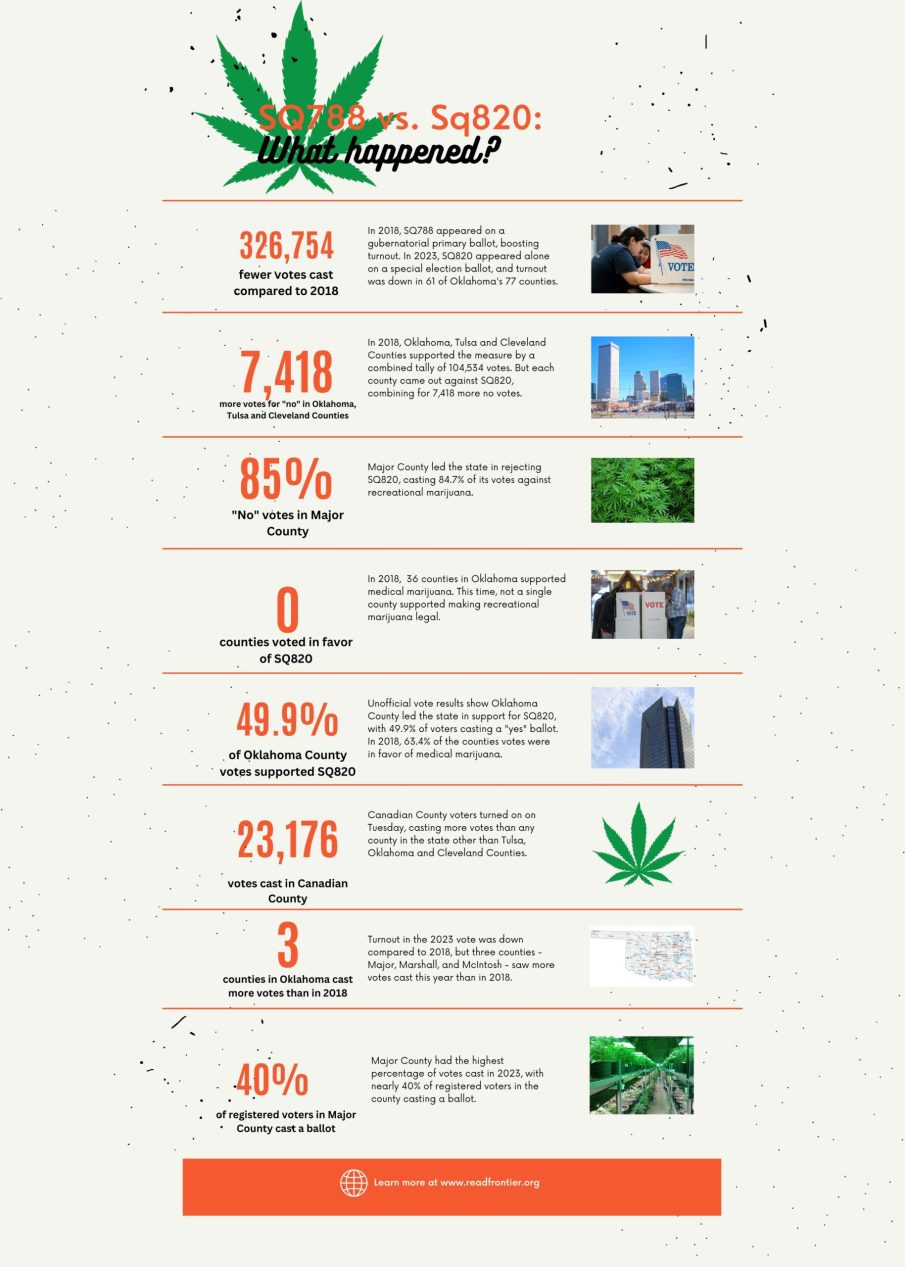
Despite a dramatically reduced voter turnout compared to the vote for medical marijuana in 2018, 16 Oklahoma counties cast more “no” votes against recreational marijuana this month than they did when the state legalized medical cannabis five years ago.
Many expected low turnout for State Question 820 on Tuesday after the measure was set for a special statewide election in March with nothing else on the ballot. But few expected the vote to be so lopsided. There were 326,754 fewer votes cast in Tuesday’s election compared to the 2018 vote on medical marijuana, but the 319,862 people who voted against recreational use nearly matched the 385,176 who voted against medical cannabis in 2018.

In 45 Oklahoma counties, more than 70% of votes cast were against State Question 820. More than 80% of votes in Major, Harper, Dewey, Kingfisher, Roger Mills and Ellis counties were against the proposal

It wasn’t just rural Oklahoma that rejected the ballot measure. Most onlookers expected the state’s urban areas, Oklahoma, Tulsa and Cleveland counties, home to the University of Oklahoma, to support State Question 820. In 2018, those three counties each favored medical marijuana by more than 62% of the vote.
But in 2023, recreational marijuana failed to carry a single county. And this time, Oklahoma, Tulsa and Cleveland counties all saw voters turn against expanding access to cannabis. Those three counties said ‘no’ to State question 820 by 7,418 combined votes.
“I think that there’s a really strong potential that the state legislature looks at this (vote result) as a mandate and says we need to really clamp down on the marijuana industry, which we do, but we have to be smart about how we do it,” said Rep. Scott Fetgatter, R-Okmulgee, a leading House voice on marijuana issues. “Because if we’re not careful, what will end up happening is we will clamp down on those people that are obeying the laws and trying to do this legally.”
Had it passed, State Question 820 would have legalized recreational marijuana use for adults age 21 and over with a 15% excise tax on all sales, and would have thrown out or expunged most previous marijuana convictions in the state.
Ryan Kiesel, senior advisor to the Yes on 820 campaign, said the campaign was still going through exit polling data on Wednesday and declined to speculate on why the measure performed so poorly in the state’s three most urban counties.
Kiesel said the campaign was concerned about low voter turnout as well as difficulty reaching rural voters in the run-up to Tuesday’s election.
“I think we always knew turnout was going to be an issue and having a low-turnout election was going to be a challenge. That definitely played itself out last night,” Kiesel said. “I think that rural Oklahoma in particular had some legitimate concerns about cannabis and cannabis policy in the state of Oklahoma.”
Oklahoma voters are not alone in their rejection of recreational marijuana. In 2022, Arkansas, North Dakota and South Dakota rejected similar measures, though all three states have already legalized medical marijuana. Two other states — Maryland and Missouri — voted in favor of recreational use last year.

Since medical marijuana was legalized by voters in Oklahoma in 2018, the Legislature has passed several bills into law that restrict or further regulate the industry, including placing a moratorium on new medical marijuana businesses until August 2024 and restricting where those businesses can be located. This legislative session, there are numerous bills dealing with medical marijuana, including bills to restrict those businesses from locating near places of worship, allow cities to use the zoning process to prohibit medical marijuana businesses from locating in certain areas, and prohibiting people under the influence of legally-obtained medical marijuana from carrying or using firearms.
On Wednesday, lawmakers advanced a bill that would add new hurdles for citizen-led initiatives to reach a ballot. The bill would expand the time for protests, tighten signature and verification requirements and add a fee for filing petitions.
Medical marijuana license holders have dwindled somewhat from a high of 386,913 patients in May 2022, to 369,468 patients in February, the lowest level since June 2021.
But the number of medical marijuana dispensaries in the state continue to grow. There are 2,759 in Oklahoma today, up from 2,238 at the beginning of 2022, state data shows.
“The medical program we received from voters is not what they voted for to begin with,” said Pat McFerron, campaign manager for the No 820 campaign. “So in the voter’s mind, there should be a difference between medical and recreational. So, I think this is a repudiation of how far the quote unquote, medical system we have in place has gone.”
Correction: The original story transposed vote data for two counties. The error has been corrected.

